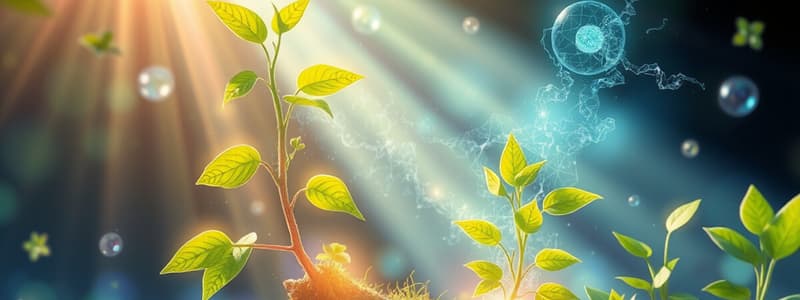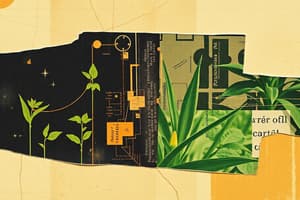Podcast
Questions and Answers
Which components are necessary for the light dependent reactions of photosynthesis?
Which components are necessary for the light dependent reactions of photosynthesis?
- NADPH and O2
- Glucose and oxygen
- ATP and CO2
- Water and energy from sunlight (correct)
What is produced during the light independent reactions of photosynthesis?
What is produced during the light independent reactions of photosynthesis?
- O2 and glucose
- ATP and NADPH
- NADP and high energy sugars (correct)
- Water and energy
How do plants obtain carbon dioxide for photosynthesis?
How do plants obtain carbon dioxide for photosynthesis?
- From soil nutrients
- From the xylem
- From the air via stomata (correct)
- Through the roots
What is the primary role of ATP in the cellular processes related to photosynthesis?
What is the primary role of ATP in the cellular processes related to photosynthesis?
Which process occurs in the thylakoid membranes during photosynthesis?
Which process occurs in the thylakoid membranes during photosynthesis?
What is the primary function of ATP and NADPH produced during the light-dependent reactions?
What is the primary function of ATP and NADPH produced during the light-dependent reactions?
Where does the process of photosynthesis take place within a plant cell?
Where does the process of photosynthesis take place within a plant cell?
What is released as a byproduct of the light-dependent reactions?
What is released as a byproduct of the light-dependent reactions?
Which part of the chloroplast is involved in light-dependent reactions?
Which part of the chloroplast is involved in light-dependent reactions?
What role does the enzyme Rubisco play in photosynthesis?
What role does the enzyme Rubisco play in photosynthesis?
Which of the following is NOT a product of glycolysis?
Which of the following is NOT a product of glycolysis?
Which statement best describes the electron transport chain in photosynthesis?
Which statement best describes the electron transport chain in photosynthesis?
What occurs during the reduction phase of the Calvin cycle?
What occurs during the reduction phase of the Calvin cycle?
How do mitochondria and chloroplasts differ in terms of DNA?
How do mitochondria and chloroplasts differ in terms of DNA?
What is the primary purpose of aerobic respiration compared to anaerobic respiration?
What is the primary purpose of aerobic respiration compared to anaerobic respiration?
Flashcards are hidden until you start studying
Study Notes
Photosynthesis Overview
- Occurs primarily in leaves, utilizing water, carbon dioxide (CO2), and sunlight to produce glucose and oxygen.
- Producers are the major source of chemical energy on Earth.
- Chloroplasts are the sites of photosynthesis, containing stroma (liquid) and thylakoid membranes (light-dependent reactions).
Key Processes
-
Light-Dependent Reactions:
- Take place in thylakoid membranes.
- Require water and sunlight.
- Produce ATP, NADPH, and oxygen (O2) as byproduct.
-
Light-Independent Reactions (Calvin Cycle):
- Depend on ATP, NADPH, and CO2.
- Produce high-energy sugars, NADP+, and ADP+P.
- ATP and NADPH from light-dependent reactions serve as energy carriers.
Photosynthesis Equation
- Simplified equation: 6CO2 + 6H2O → C6H12O6 + 6O2.
Chloroplast Structure
- Contain chlorophyll that captures sunlight, making plants green.
- Composed of two phospholipid bilayers.
- Thylakoids house the electron transport chain.
Water and Oxygen Dynamics
- Water enters thylakoids from roots and is split by sunlight energy.
- Oxygen diffuses out of stomata as a waste product.
- Electrons generated are transported through the electron transport chain, eventually forming NADPH.
ATP Production
- Hydrogen ions (H+) accumulate in thylakoid space during electron transport.
- H+ ions are pumped out through ATP synthase, generating ATP from ADP.
- Oxygen derived from the split water molecules.
Key Enzymes and Processes
- Rubisco: Enzyme that facilitates carbon fixation during the Calvin Cycle.
- Carbon dioxide must undergo carbon fixation to be used in glucose formation.
- Glycolysis occurs in the cytoplasm, producing pyruvate, ATP, and NADH.
Cellular Respiration
- Plants perform both photosynthesis and cellular respiration.
- Cellular respiration can be aerobic (with oxygen) or anaerobic (without oxygen).
- Aerobic Respiration:
- Includes glycolysis, the Krebs cycle, and oxidative phosphorylation.
- Produces substantial ATP through the use of oxygen.
Mitochondria Structure
- Inner membrane folds create more surface area for the electron transport chain.
- Matrix serves as the liquid environment, akin to the stroma in chloroplasts.
- Intermembrane space is crucial for creating a concentration gradient during respiration.
- Mitochondria and chloroplasts each contain their own DNA.
Summary of Energy Production
- Glycolysis splits glucose, generating 2 ATP, 2 NADH, and 2 pyruvate.
- In aerobic respiration, pyruvate converts into a two-carbon molecule if oxygen is present, leading to further ATP production.
- Oxidative phosphorylation is the final step, producing water and maximizing ATP yield through electron transfer.
Studying That Suits You
Use AI to generate personalized quizzes and flashcards to suit your learning preferences.




